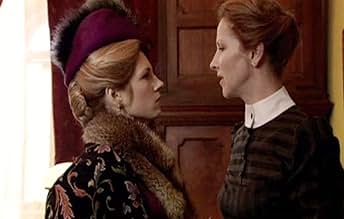VALUTAZIONE IMDb
6,4/10
4980
LA TUA VALUTAZIONE
Aggiungi una trama nella tua linguaViennese doctor Josef Breuer meets with philosopher Friedrich Nietzsche to help him deal with his despair.Viennese doctor Josef Breuer meets with philosopher Friedrich Nietzsche to help him deal with his despair.Viennese doctor Josef Breuer meets with philosopher Friedrich Nietzsche to help him deal with his despair.
Michal Yannai
- Bertha
- (as Michal Yanai)
Ayana Haviv
- Singer - 'Hymnus an den leben'
- (non citato nei titoli originali)
Trama
Lo sapevi?
- Citazioni
Josef Breuer: How could I have given up everything?
Nietzsche: You'd given up everything long before you met me.
Josef Breuer: Yes, but now I have nothing.
Nietzsche: Nothing *is* everything. In order to grow strong, you must first sink your roots deep into nothingness. Learn to face your loneliest loneliness.
Recensione in evidenza
I just wonder how many people are going to be tuned in to seeking out and sitting through a film all about psychoanalysis, detailing very briefly the more desperate incidences in the lives of some of the most brilliant minds ever to have graced Earth. My heart hopes as many as possible but my mind tells me not many will bother, and given this that's quite a shame. The film is a concentrated study on illness and the effects of illness but the said sickness is more affiliated to love or problems of a psychological kind. The events, no matter how fabricated over history, are still compelling and the film just about works as a drama or a study of an individual's actions given their emotions that run on a dizzying high.
The film follows Josef Breuer (Cross) and Friedrich Nietzsche (Assante) who meet and attempt to help one another. The setting is 1870s Vienna in Austria at a time when some of the most brilliant minds ever would congregate to pioneer the study of psychoanalysis; love as an illness and what makes us who we are through these events. On this occasion, Nietzsche has fallen for a woman and she is Lou Salome (Winnick). This acts as the catalyst for him to seek help from Breuer, an experienced and responsible doctor who has battled his own demons in the past to do with one of his parents' early death. Nietzsche at first seeks to run from his problem, thinking escaping to Switzerland will compensate for the pain following the rejection of marriage.
But this isn't the end of it. There is no surprise that a film dealing with psychoanalysis, and containing Sigmund Freud, has a few mind games up its sleeve. The film is uncannily seductive in its general atmosphere and quite humbling on other occasions. Breuer is good friends with Sigmund Freud himself (Elman) and they both seem overly concerned with Nietzsche which propels them into at least pretending one of them needs help from Nietzsche in return.
In order to achieve this, Breuer assumes the stance that he himself is falling in love with one of his patients and requests the help from Nietzsche in return he help him get over his break up. There's a lot of psychology going on here and a lot of scenes and content that deals with mental health. Nietzsche undergoes perhaps the more interesting study of the characters because his is the more dramatic, slipping into despair and depression after initially trying to combat the break up with 'remedy' from prostitution and, like I mentioned, fleeing entirely.
The point When Nietzsche Wept has going for it the whole time is the age of these primary characters. This is not a (another?) mere look at young people in contemporary America or wherever trying to get over relationships or trying to instigate one so that they may have sex, this is a thoughtful and interesting look at people of an older age dealing with real issues that at the time, remained as scary and as ambiguous as you could possibly imagine. The frightening thing that should remain at the back of the viewer's mind is 'what if you were very ill, but you did not know of the illness you have?' Twinned with this, what if you did not know of the treatment and the pain or whatever would simply not disappear? Nowadays, we're all fine with our doctors and so forth and our teen sex comedies that act as an escapist or humoured look at coming of age or love or sex or whatever but When Nietzsche Wept is a pit stop; a look back at times past.
The film is a grand display of surrealism, dreams often beginning naturally enough before descending into chaos. We the audience ask the question of what is going on and just when it seems the impossible or the downright obscure is about to happen, our questions are answered. The film is a study into the great minds that pioneered certain theory but it's a look at their own struggles; their own struggles that helped shape an understanding in the first place. The film is a study of a delicate mentality as expressed by those of a brilliant natural intelligence.
Whether it's the bizarre manner in which Breuer refers to Freud as 'Siggy' or the odd scenes to do with diegetic classical music complete with orchestra that Nietzsche himself composes to the bemusement of those around him, the film remains an interesting look at a subject that is being dealt with head on rather than in a metaphorical or dramatic way, much like Hitchcock and Lynch have done in the past. But don't be fooled for it isn't a documentary and it does retain a fair amount of drama throughout. It may not be as good a metaphorical study but it remains interesting and thought-provoking.
The film follows Josef Breuer (Cross) and Friedrich Nietzsche (Assante) who meet and attempt to help one another. The setting is 1870s Vienna in Austria at a time when some of the most brilliant minds ever would congregate to pioneer the study of psychoanalysis; love as an illness and what makes us who we are through these events. On this occasion, Nietzsche has fallen for a woman and she is Lou Salome (Winnick). This acts as the catalyst for him to seek help from Breuer, an experienced and responsible doctor who has battled his own demons in the past to do with one of his parents' early death. Nietzsche at first seeks to run from his problem, thinking escaping to Switzerland will compensate for the pain following the rejection of marriage.
But this isn't the end of it. There is no surprise that a film dealing with psychoanalysis, and containing Sigmund Freud, has a few mind games up its sleeve. The film is uncannily seductive in its general atmosphere and quite humbling on other occasions. Breuer is good friends with Sigmund Freud himself (Elman) and they both seem overly concerned with Nietzsche which propels them into at least pretending one of them needs help from Nietzsche in return.
In order to achieve this, Breuer assumes the stance that he himself is falling in love with one of his patients and requests the help from Nietzsche in return he help him get over his break up. There's a lot of psychology going on here and a lot of scenes and content that deals with mental health. Nietzsche undergoes perhaps the more interesting study of the characters because his is the more dramatic, slipping into despair and depression after initially trying to combat the break up with 'remedy' from prostitution and, like I mentioned, fleeing entirely.
The point When Nietzsche Wept has going for it the whole time is the age of these primary characters. This is not a (another?) mere look at young people in contemporary America or wherever trying to get over relationships or trying to instigate one so that they may have sex, this is a thoughtful and interesting look at people of an older age dealing with real issues that at the time, remained as scary and as ambiguous as you could possibly imagine. The frightening thing that should remain at the back of the viewer's mind is 'what if you were very ill, but you did not know of the illness you have?' Twinned with this, what if you did not know of the treatment and the pain or whatever would simply not disappear? Nowadays, we're all fine with our doctors and so forth and our teen sex comedies that act as an escapist or humoured look at coming of age or love or sex or whatever but When Nietzsche Wept is a pit stop; a look back at times past.
The film is a grand display of surrealism, dreams often beginning naturally enough before descending into chaos. We the audience ask the question of what is going on and just when it seems the impossible or the downright obscure is about to happen, our questions are answered. The film is a study into the great minds that pioneered certain theory but it's a look at their own struggles; their own struggles that helped shape an understanding in the first place. The film is a study of a delicate mentality as expressed by those of a brilliant natural intelligence.
Whether it's the bizarre manner in which Breuer refers to Freud as 'Siggy' or the odd scenes to do with diegetic classical music complete with orchestra that Nietzsche himself composes to the bemusement of those around him, the film remains an interesting look at a subject that is being dealt with head on rather than in a metaphorical or dramatic way, much like Hitchcock and Lynch have done in the past. But don't be fooled for it isn't a documentary and it does retain a fair amount of drama throughout. It may not be as good a metaphorical study but it remains interesting and thought-provoking.
- johnnyboyz
- 25 nov 2008
- Permalink
I più visti
Accedi per valutare e creare un elenco di titoli salvati per ottenere consigli personalizzati
- How long is When Nietzsche Wept?Powered by Alexa
Dettagli
- Data di uscita
- Paese di origine
- Siti ufficiali
- Lingua
- Celebre anche come
- Nietzsche Ağladığında
- Luoghi delle riprese
- Azienda produttrice
- Vedi altri crediti dell’azienda su IMDbPro
- Tempo di esecuzione1 ora 45 minuti
- Colore
- Mix di suoni
- Proporzioni
- 1.85 : 1
Contribuisci a questa pagina
Suggerisci una modifica o aggiungi i contenuti mancanti





























